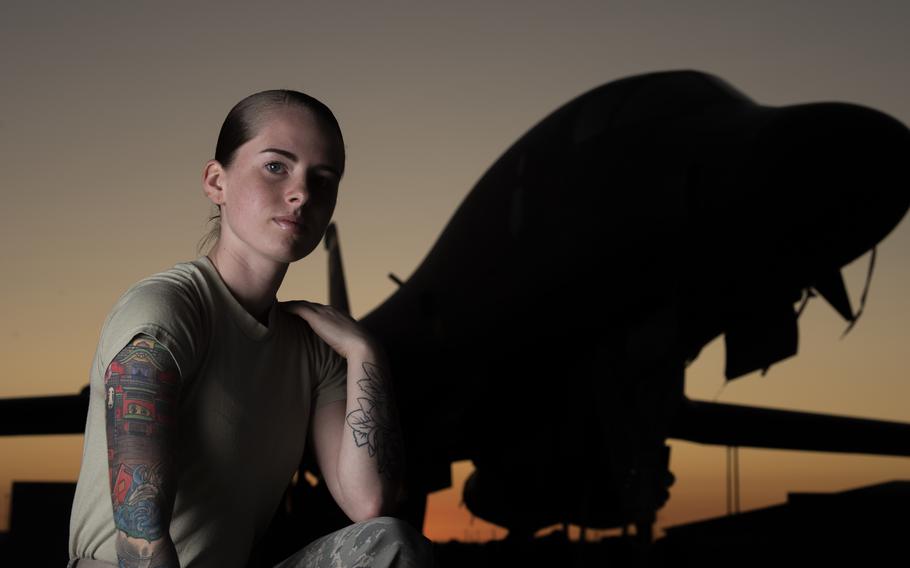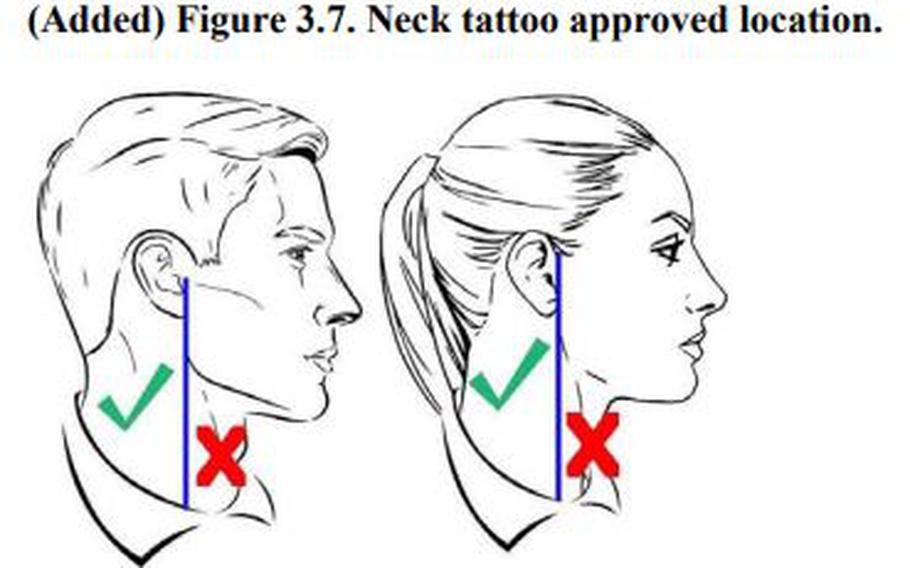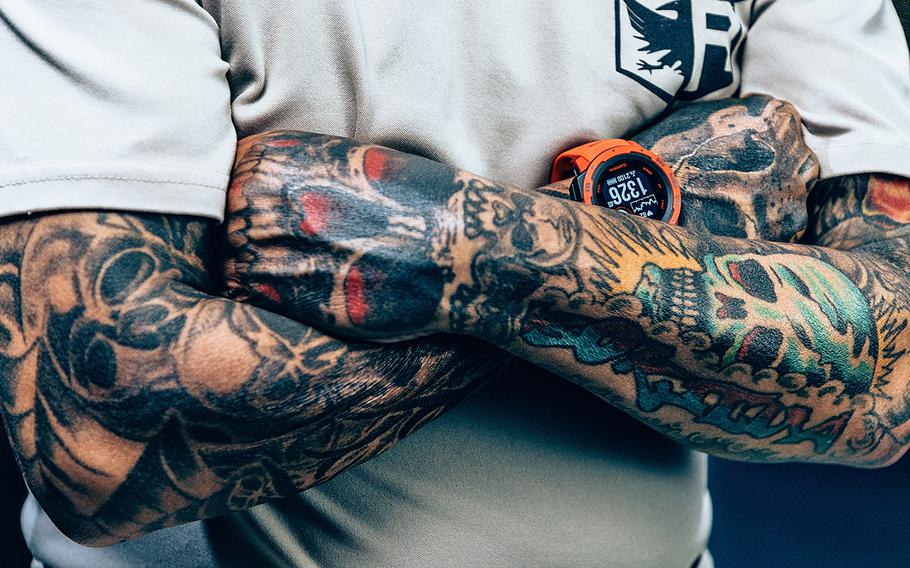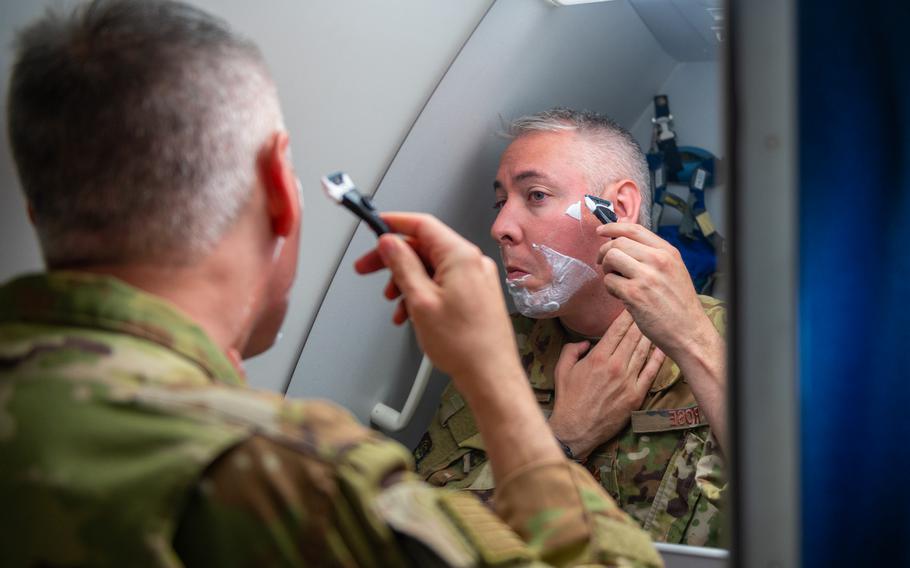
Senior Airman Autumn Rosado, 9th Aircraft Maintenance Unit avionics technician and a tattoo artist in her off-duty time, shows off her tattoos in front of a B-1B Lancer at Dyess Air Force Base, Texas, Sept. 18, 2019. A newly released Air Force regulation now allows airmen limited neck and hand tattoos. (River Bruce/U.S. Air Force)
The Air Force style authorities have spoken: neck and hand tattoos are in, beards are still out.
The new version of the service’s dress and appearance standards policy allows tattoos up to 1 inch long on the hands and back of the neck, which were previously banned.
Tattoos are the third highest disqualifier for service, behind physical and citizenship standards, Chief Master Sgt. of the Air Force Joanne Bass told Stars and Stripes in a statement Thursday.
The service turned away 4,240 prospective recruits between 2018 and 2022 because of tattoo disqualifications, Bass said. About 32% of them would have qualified under the new rules.
"We are potentially losing high-quality airmen to a policy that has not kept pace with the times,” Bass said. “This is about bringing in the talent we need to build the force of the future.”
The Air Force is looking at many other policy changes “when it comes to addressing barriers to service,” Bass said.
A service statement on Wednesday announcing the changes cited rising numbers of hand and neck tattoos among America’s youth as one of the leading obstacles to remaining competitive in recruiting.
The new rules allow only one neck tattoo to be placed behind an imagined vertical line extending from the ear opening, which rules out throat tattoos.

A new release of Air Force instruction on appearance standards allows neck tattoos for airmen as long as the body art is limited to an inch in measurement and placed on the back of the neck. (U.S. Air Force)
One single band ring tattoo on one hand has been allowed since 2017. In addition to the inked band on one finger, the service now allows one single tattoo on each hand, each no larger than one inch, the regulation states.
Most tattoos are allowed to be visible while in uniform. Chest tattoos are allowed but can’t show when wearing open-collared uniform shirts.
Tattoos on the face, tongue, lips, eyes, and scalp are still off limits, according to the new regulation.
Although the policy opens more “canvas” to body art enthusiasts, service officials said that tattoos deemed obscene, discriminatory, extremist, or affiliated with gang and supremacist organizations are not permitted.
Likewise, artwork that “shocks the moral sense … because of its vulgar, filthy, or disgusting nature, or its tendency to incite lustful thought” is prohibited, the regulation states.
Covering up impermissible tattoos with bandages or make up isn’t allowed either.

Military veteran Enrique Torres shows his tattooed arms in August 2021 at Kleber Kaserne in Kaiserslautern, Germany. A newly released Air Force regulation allows airmen neck and hand tattoos up to 1 inch long, so this artwork still would not be allowed for them. (Brittany Atkins)
While the policy change has been welcomed by some as a step toward a more inclusive Air Force, others criticized it as superficial and contradictory.
Commenters on the popular r/AirForce channel on Reddit, where current and former airmen exchange memes, rants and news, questioned allowing a neck tattoo but not a beard, which some said is more natural and no less professional than body art.
“I’ve seen a couple of people with beard waivers that genuinely looked more professional with a well-trimmed beard than when they shaved, I’ve never seen a neck tattoo make someone look more professional Lol,” one commenter wrote after the change was announced Thursday.
In late May 2022, the Air Force published a memorandum allowing airmen to wear ever-so-slightly longer mustaches, extending no more than 1/4 inch beyond a vertical line “drawn from the corner of the mouth.”
Nearly a year later, however, the guidance publication has yet to be updated to authorize the longer mustaches. When it comes to beards, male airmen continue to be limited to medical shaving waivers and religious accommodation requests.

Maj. Kevin Rose, 349th Air Refueling Squadron instructor pilot, shaves during a 24-hour sortie, May 6, 2022. A new update to the Air Force’s dress and appearance regulations maintains that beards only are authorized for medical reasons. (Brenden Beezley/U.S. Air Force)
Beards, however popular, aren’t an irreversible barrier to enlistment the way neck and hand tattoos once were. The new policy comes amid a broader effort by the service to attract and retain Generation Z recruits.
While the service met its recruiting goal in 2022, Maj. Gen. Ed Thomas, Air Force Recruiting Service commander, said at the time that “record-low unemployment rates and steadily declining familiarity with the U.S. military” make recruiting a long-term challenge.
The regulation changes are driven by a new cross-functional team, which is charged with reviewing policies and procedures “with the modern American in mind,” the service said in the statement Wednesday.
Other potential recruiting incentives the team is considering are a return to accelerated naturalization at basic military training, a policy ended by the Trump administration; reinstatement of enlisted college loan repayment programs; and new initial enlistment bonuses, the Air Force said Thursday.